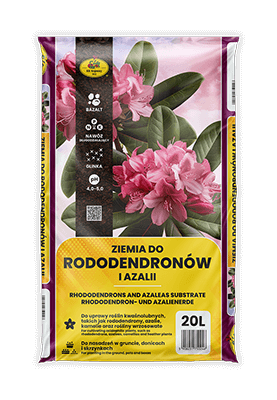



• Growing acidophilic plants: rhododendrons, azaleas, camellias, heaths
• Planting in the ground and in pots
• Growing in the garden, on the terraces and balconies, at home
• Peat
• Compost from bark
• Sand
• Clay
• Long-acting fertilizer
• Salinity: < 2,0g/l
• Structure: 0-40mm
• The best time for planting is spring
• Mechanically pressed product
• Before use, it is recommended to loosen it, and when the substrate is dry - soak it with water
• On the day before transplanting, water the plant generously
Transplanting into pots
• Choose a clean pot or box with drainage holes - larger than the root ball
• Pour drainage to the bottom of the container (e.g. expanded clay) and then partially fill with rhododendrons and azaleas substrate
• Carefully remove the root ball, gently remove dead roots, and loose the twisted ones
• We put the plant (it should grow at the same depth) and fill the pot with rhododendrons and azaleas substrate - up to 2 cm below the edge
• After transplanting, lightly knead the substrate and water moderately
Transplanting shrubs
• Dig a hole about 30% larger than the root ball and fill it partly with rhododendrons and azaleas substrate
• Carefully remove the root ball, gently remove dead roots, and loose the twisted ones
• We put the plant (it should grow at the same depth) and fill the rest of the hole with rhododendrons and azaleas soil
• After transplanting, lightly knead the substrate and water it abundantly for the first time
Practical advice
• It is recommended to start fertilizing 3-4 months after transplanting
• Rhododendrons and other acidophilic plants prefer slightly shaded places
• The pot should be about 30% larger in diameter than the root ball
• Containers with smaller dimensions will not provide plants with adequate space for the proper growth of the root ball, which will cause the substrate to dry very quickly
• Pots with plants should be kept in the constant humidity possible
• A change in the color of the substrate indicates the state of its humidity and the need for watering
• Excessive watering can lead to the development of algae in the soil